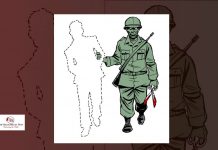United States Commission on International Religious Freedom has designated Pakistan a “country of particular concern” in its 2020 annual report under the International Religious Freedom Act.
USCIRF is an American agency that monitors religious freedom issues globally and encapsulates their findings in the form of annual reports. Their annual report for 2020 was released a few days ago on April 28.
On the religious conditions in Pakistan, the report began by stating that, “In 2019, religious freedom conditions across Pakistan continued to trend negatively.” The Washington-based international watchdog criticized Pakistan’s inability to cope with religious extremism and the blatant misuse of blasphemy and anti-Ahmadiyya law.
USCIRF mentioned various incidents of religious bigotry in the country. The five-year imprisonment and subsequent death sentence of Abdul Hafeez in December 2019; the murder of Khalid Hameed by one of his pupils on the accusation of “anti-Islamic” remarks; the inflammation and demolition of houses and temples of the Hindu community on unfounded blasphemy accusations; dereliction of houses by 200 Christian families following the accusation of four Christian women for blasphemy, are but a few.
The report extensively criticized Pakistan’s blasphemy law – which declares anyone involved in the dissemination of offensive content about Islam and its prophet punishable by death – and the anti-Ahmadiyya law – which declares Qadianis as non-muslims and precludes them from holding high diplomatic ranks in the governments. “Ahmadi Muslims, with their faith essentially criminalized, continued to face severe persecution from authorities as well as societal harassment due to their beliefs, with both the authorities and mobs targeting their houses of worship” the report stated.
USCIRF also emphasized on the forceful abduction, subsequent conversion, and eventual marriage of the young Hindu, Christian, and Sikh girls all over Pakistan, especially in Sindh. Those resisting the conversion are physically assaulted and even subjected to rape. The report estimates that the number of enforced conversions of young girls could be as much as 1000 in the previous year. The judicial inquiries of the forced conversion and marriages are mostly held in the presence of the husbands of the girls which makes it even harder to admit coercion. Following the incidents, a bill, seeking to criminalize the forced conversions, was rejected by the Sindh high court in October 2019. This made it much more difficult for minorities to pursue justice in the country.
The annual report further explores the misuse of the blasphemy law in Pakistan. The blasphemy law deems anyone defiling Quran or a mosque, or disrespecting the prophet of Islam as punishable by death. Following these criteria, numerous cases of alleged blasphemy have been reported in the country; most of which have ended with vigilantism. The blasphemy cases are often based on baseless charges and the accusers are mostly not bound to present evidence. Under severe public pressure, the cases often hopscotch between judges, whereas the lawyers of the accused are mostly threatened to retract. Salman Taseer, the former governor of Sindh and a vocal critic of the blasphemy law, was killed by one of his security guards for supporting a Christian woman accused of blasphemy. The woman, Asia Bibi, was acquitted by the Supreme Court of Pakistan in 2018, thus engendering a national outcry. Officially, the Pakistani government has not executed a single person for blasphemy but the extrajudicial lynching has claimed 62 lives since 1990.
Commenting on the anti-Ahmadiyya law, the report states that ” [the] articles 298(b) and 298(c) of the Penal Code prohibit Ahmadis from self-identifying as Muslims, propagating or disseminating materials about their faith, or calling their houses of worship mosques.” The law relegates Ahmadis to separate electorates and prohibits them from voting as Muslims. In severe circumstances, Ahmadis have even been sued for preaching their faith.
Outlining the violence by various extremist groups, the report recounts major assaults carried out across the country on non-muslims, Shias, and Sufis. “In May 2019, a Sufi shrine in Lahore was bombed, killing 10 people and wounding 20”, the report recalls. Further, ISIS and Pakistani Taliban collectively acknowledged the responsibility of bombing a Shia neighbourhood in Quetta, killing 24 and wounding manifolds more. Afterwards, various major attacks have been carried out on the Hazara community; thereby disrupting the peaceful and secular environment of Balochistan.
The report also condemns Pakistan for housing internationally recognized terrorist organizations like Lashkar-e-Taiba and Jaish-e-Muhammad. Pakistan also accommodates Islamist militants like Hafiz Saeed and Masood Azhar, the former having a bounty of $10 million on his head by the United States for his involvement in Mumbai attacks of 2012.
The report also notes many major positive developments in Pakistan’s religious landscape such as the opening of Kartarpur corridor with India, the renovation of a Hindu temple in Sialkot, the acquittal of Asia Bibi and Wajih-ul-Hassan from blasphemy charges, and the impending implementation of an impartial common national curriculum in 2021. The Pakistani government also exonerated Abdul Shakoor, ah Ahmadi charged on terrorism for “sharing Ahmadiyya literature.” The government has also announced that nationalization of 30,000 madrassas and has taken measures to address offensive educational material.






























